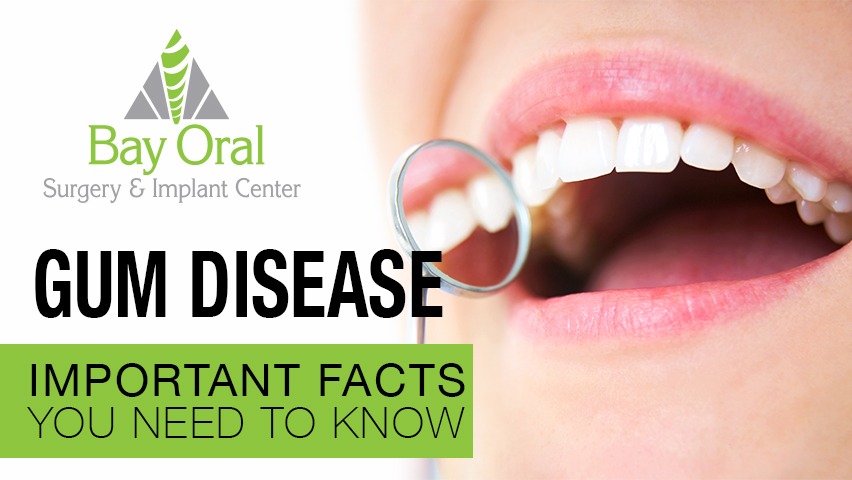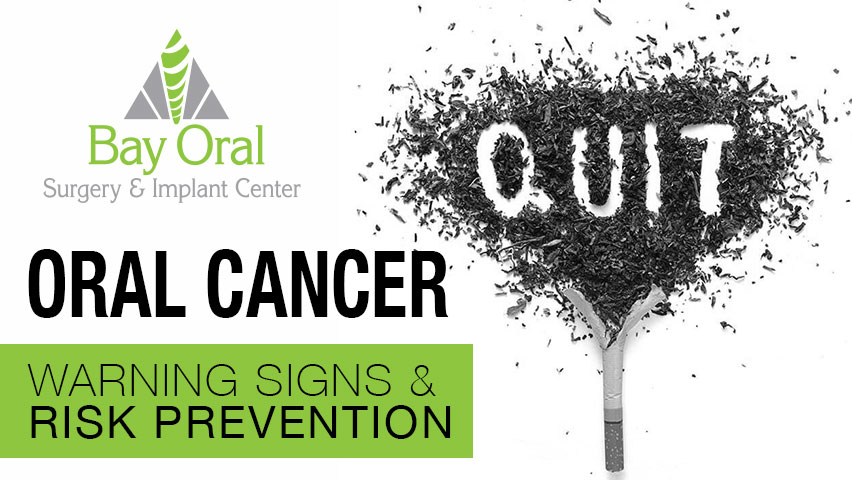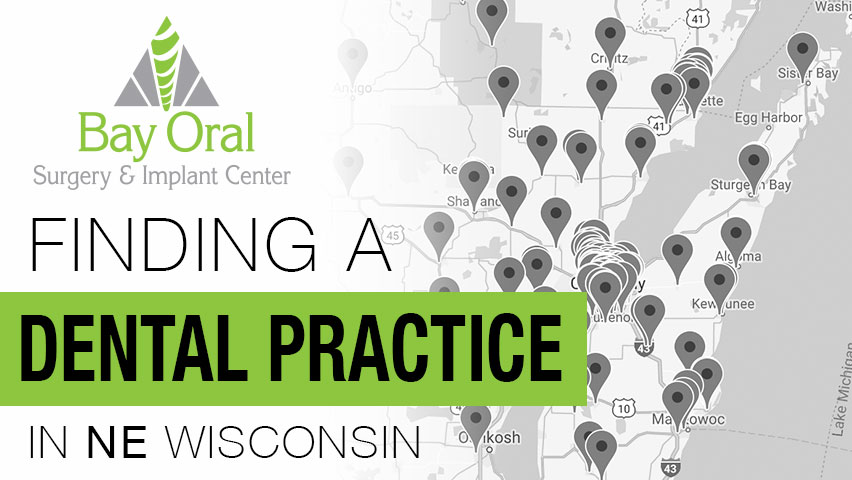
by Bay Oral Surgery | May 15, 2019 | Blog

According to findings from the Centers for Disease Control and Prevention (CDC), one out of every two Americans aged 30 and older has periodontal disease, also known as gum disease. This means that approximately 64.7 million Americans are affected, so it’s now more important than ever to understand the facts behind this growing epidemic, the causes & risk factors, and how to treat it.
What is Gum Disease?
Gum disease is an inflammation of the gums that can progress to affect the bone that surrounds and supports your teeth. The two most common types are gingivitis and periodontitis. The mildest form of this disease is gingivitis, which causes the gums to become swollen, red, and bleed easily. If gingivitis is left untreated, it can advance to periodontitis. Periodontitis is a serious gum infection that damages the soft tissue and destroys the bone supporting your teeth. Gums begin to separate from your teeth and form pockets that become infected, which can lead to tooth loss.
Causes & Risk Factors
The main cause of periodontal disease is improper oral hygiene, but other factors affect the health of your gums as well. Below are some of the most common risk factors:
- Tobacco – Smoking cigarettes or chewing tobacco prevents the gum tissue from being able to heal properly.
- Alcohol – Consuming alcohol regularly tends to increase plaque levels on your teeth due to the sugar content in alcohol. Additionally, alcohol causes dehydration and dry mouth, which reduces saliva flow and increases the risk of tooth decay.
- Diabetes – Diabetes causes blood vessels to thicken, slowing the flow of nutrients and the removal of harmful wastes, which weakens the resistance of gum and bone tissue to infection. When diabetes is poorly controlled, high glucose levels in your saliva may help germs grow and set the stage for gum issues.
- Nutrition – Diets that are high in sugar and carbohydrates will increase the formation of plaque, and a deficiency of important nutrients such as vitamin C will impair healing.
- Aging – Studies show that the senior population has the highest rate of periodontal disease, with 70% of Americans over the age of 70 experiencing periodontitis.
- Stress – Many studies have been conducted that link stress as a factor in fighting off infections such as periodontal disease.
- Teeth Clenching & Grinding – Clenching or grinding your teeth can put excess force on the supporting tissues of the teeth and could speed up the rate at which these periodontal tissues are destroyed.
- Puberty & Hormones – Women have an increased sensitivity to oral health problems because of the unique hormonal changes they experience. These hormonal changes not only affect the blood supply to the gum tissue, but also the body’s response to the toxins that result from plaque build up.
- Medications – Many medications can cause a reduction in saliva, which is necessary to help prevent infection and tooth decay. Some medications for allergies, high blood pressure, and depression are known to reduce saliva flow.
Gum Disease Treatment
Treatment options will vary depending on the symptoms and stage of your infection. The goal is to control your infection and consult your dentist for the right treatment plan for you. To learn more about gum disease and the treatment options available to you, consult with your dentist or find a dentist near you on our website.

by Bay Oral Surgery | Apr 15, 2019 | Blog

Oral or oropharyngeal cancer kills roughly one American every hour. Since April is Oral Cancer Awareness Month, now is a good time to reflect on the sobering statistics and focus on prevention.
Risk factors
Tobacco and alcohol: Although lifestyle and other factors can contribute to oral cancer, people who use tobacco and alcohol consumption are at the greatest risk. And, when tobacco use and heavy drinking are combined, the risk becomes even greater. According to the Oral Cancer Foundation, a combination of the two behaviors appears to have a synergistic effect that increases risk.
Diet: What you eat may also play a smaller role in oral cancer. Studies have shown that a diet rich with fruits and/or vegetables has been associated with a decreased risk of oral or when compared with lower consumption.
HPV: Approximately 12,000 Americans ages 15 to 24 are infected with HPV every day. This is a frightening statistic considering that oropharyngeal cancers, mostly in the tonsil areas and base of the tongue, are primarily caused by the HPV virus. Testing positive for HPV doesn’t guarantee you will get the disease, but it is a significant risk factor.
Warning signs and prevention
Unfortunately, oral cancer can be difficult to detect in early stages, so patients may not recognize symptoms until the disease has progressed. In fact, a little more than half of patients diagnosed with oral cancer will still be alive in five years. According to Mayo Clinic, these are some things to watch out for:
- A lip or mouth sore that doesn’t heal
- A white or reddish patch on the inside of your mouth
- Loose teeth
- A growth or lump inside your mouth
- Mouth pain
- Ear pain
- Difficult or painful swallowing
Oral cancer is preventable. Quitting tobacco use is the best way to reduce your risk of oral and many other kinds of cancer. Other lifestyle changes, including reduced alcohol consumption, a healthy diet and avoiding sun exposure/wearing lip balm with sunscreen can also reduce risk. Make sure you get an oral cancer screening at every regular dental check-up. If you experience symptoms that don’t go away, tell your dentist immediately.
Visit www.oralcancerfoundation.org to learn more about free screenings or how you can get involved. Or, contact us at Bay Oral to schedule an appointment.

by Bay Oral Surgery | Mar 14, 2019 | Blog

Whether your trusted family dentist is retiring or you’re moving to a new community and need to seek out a new dental practice, finding the right provider can be a daunting undertaking. After all, you only get one permanent set of teeth in your lifetime, so it’s extremely important to have an oral healthcare partner you can trust. The following tips will help you choose a new provider with confidence.
Word of mouth
No pun intended, but your friends, family and co-workers know you best and their recommendations can save you a lot of time vetting dental practices that may not be the right match. If you’re looking for a dentist in your current location, your family doctor may be able to make suggestions. If you’re relocating, ask your dentist to make a recommendation.
Getting to the root of your needs
The American Dental Association recommends that you visit more than one dentist before making a decision. Making a list of questions in advance will help you quickly extract the information you need to make your choice.
Consider what is most important to you. For example, if you’re a busy working parent on the go, flexible, convenient office hours and close proximity to home may be a priority. Be sure to ask about the dentist’s policy on late cancellations or missed appointments.
A dental practice with an updated website that contains helpful patient information and a user-friendly portal can be a real time-saver as well. Find out if you can ask questions, schedule appointments and pay bills online.
If you have anxiety about dental treatments, then you may want to inquire about anesthesia and sedation. Or, if cost is a factor in your decision, then you’ll want to be sure that you only visit dental practices that are in your insurance network and are transparent about fees and payment plans.
Give your next dentist a thorough exam
You’ll also want to be certain that your next dentist is properly credentialed and is someone who will make you feel comfortable in the dentist’s chair. Most dental practices have an “About Us” page on their website where you can read more about the dentists’ educational background, interests and hobbies. You also can call the front desk and inquire about services and appointments. If the person answering the phone is helpful and courteous, that’s a good indication that the practice’s environment is friendly and welcoming.
Now that you know what to look for, visit our “Find a Dentist” page and let us help you find your next perfect dentist!

by Bay Oral Surgery | Feb 15, 2019 | Blog
It can be hard to smile about a delicious ice cream or steaming cup of hot cocoa when you have sensitive teeth. This common problem also may make it difficult to maintain proper oral hygiene, as flossing and brushing sensitive teeth can be a painful experience. Fortunately, you don’t have to accept living with touchy teeth.
What causes sensitive teeth?
There are many potential reasons for tooth sensitivity. Gum disease is a frequent cause, so taking good care of your teeth and gums is extremely important for prevention and treatment. Your oral healthcare provider can help you determine other underlying causes of pain, including worn tooth enamel, cavities, fractured teeth, and fillings that need to be replaced.
You also may be doing things in your daily life that cause or aggravate sensitive teeth. Consider the following:
- Think twice before you crunch on ice, as that can damage the enamel on your teeth or cause your teeth to crack.
- If you are an overzealous brusher or flosser, you may be doing more harm than good to your gums. Try using a soft bristled toothbrush and a gentler approach to oral hygiene.
- If you plan to whiten your teeth, make sure you first discuss with your oral healthcare provider and follow directions carefully.
Treating sensitive teeth
Once you determine the cause of your tooth sensitivity, you can work with your oral healthcare provider on developing a treatment plan, which may include something as simple as desensitizing toothpaste or fluoride mouthwash and/or treatment. If you grind your teeth, you may want to consider a mouth guard to protect the tooth enamel.
In other instances, dental fillings, bonding or crowns may be necessary to restore decayed or damaged teeth. If your tooth cannot be restored, a dental implant may be the best solution to ensure that the replacement tooth is fully supported. Dental implants help to maintain the integrity of both your jaw and your surrounding teeth, assisting in the prevention of further oral health problems.
While sensitive teeth can be a real pain, you don’t have to settle for a life without hot fudge sundaes or steaming café lattes. Talk to your oral healthcare provider about the best treatment plan to relieve and alleviate sensitive teeth.

by Bay Oral Surgery | Jan 14, 2019 | Blog
Here at Bay Oral, we recognize that many of our patients don’t necessarily love going to the dentist so the thought of having oral surgery can be scary. That uncertainty is normal however, we would like to dispel some of those fears and answer the most common questions patients ask when considering oral surgery.
How do I know if I need oral surgery?
Oral and Maxillofacial surgeons are specially trained in surgery on gums, teeth, jaw, face and head. Most commonly your dentist will make a recommendation for you to see one of our surgeons to ensure you have the best care possible, whether you need your wisdom teeth removed or are dealing with tooth loss or facial trauma. If you think you are in need of oral surgery, schedule an appointment for a consultation today.
How long is oral surgery?
The length of the surgery depends on the type and the extent of the procedure.
Wisdom tooth removal typically last between 30 – 90 minutes.
The dental implant process can vary widely dependent on whether you need bone grafting to prepare the jaw and how long it takes for the artificial root to bond and heal with your natural jaw bone.
How long is recovery?
Recovery from dental surgery really depends on the patient and the type of surgery they are undergoing. Bleeding is normal after a tooth extraction and will usually stop within 24 hours. You can expect swelling to be completely gone within 7-10 days. We recommend that you rest for at least two days after an oral surgery to allow your body to heal and reduce the risk of dry socket. For more recovery information see our post operative instructions.
Are there foods that I need to avoid after the surgery?
Softer foods are easier to eat post-surgery (ex. jello, pudding, applesauce, ice cream, yogurt, cottage cheese, mashed potatoes, noodles, etc). Some procedures will require a no-chew diet, you will be been given instructions by your Doctor if this is the case.
Is it alright to eat before the scheduled surgery?
In general we ask all patients to abstain from eating for at least 6 hours before their appointment. This is especially important if you are undergoing general anesthesia or IV sedation. Find out more about dental surgery preparation, here.
Will I need to be under anesthesia for oral surgery?
All of our procedures at Bay Oral are surgical in nature and will require some type of anesthesia – check out our post “Dental Anesthesia / Sedation and You” to learn more.
Why did my dentist send me to an oral surgeon just to remove a tooth? Can’t he do that?
General dentists can and sometimes do perform tooth extractions, however depending on the type of impaction or if the procedure requires a surgical approach, oral surgeons are the most qualified to perform this procedure. We not only specialize in this procedure and remove thousands of teeth every year, we also provide sedation so our patients have an easier, safer and more comfortable experience.
What are dental implants?
Dental Implants are titanium posts surgically placed into the jaw bone, beneath the gums, creating a stable foundation to attach a prosthetic tooth. The implant replaces the missing root from a lost or extracted tooth.
What are some of the benefits of dental implants?
Dental Implants help preserve facial structure, preventing bone deterioration that occurs when teeth are missing. Dental implants provide a foundation for replacement teeth that look, feel, and function like natural teeth. When you choose dental implants, you regain the ability to eat your favorite foods, and smile with confidence knowing that your teeth appear natural and healthy.
Is the implant procedure painful?
Most people will attest that the dental implant procedure produces minimal discomfort due to the use of anesthetics. Patients often indicate that implants are less painful than extractions.
How long do implants last?
Dental implants commonly last longer than other methods of replacing teeth like bridges and dentures, however, the longevity of dental implants depends on a number of things; how well you take care of them, how much you avoid biting and chewing on hard objects or opening things with your teeth, and your overall health. In general, more than 90% of implants will still be functional after 10 years.
What is involved with taking care of dental implants?
Although an implant cannot decay like a natural tooth it is just as important to keep it clean and to remove the harmful bacteria buildup that can cause infection (implantitis) around the implant. Continue your regular dental cleanings for the best and most long-lasting success.






